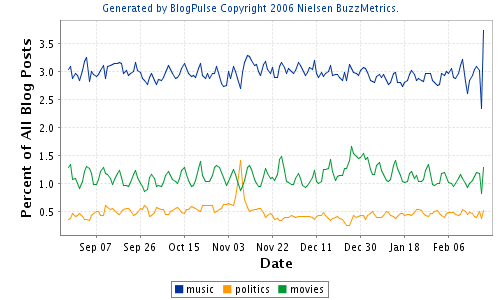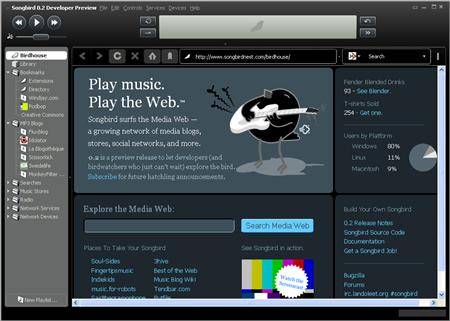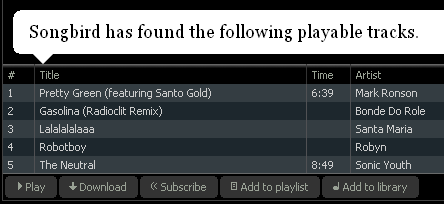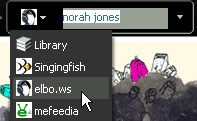Written by Alex Iskold and edited by Richard MacManus
Music makes us happy. So happy in fact that we
shake, smile and fork off billions of dollars every year on it. So it is not an accident that
music is one of the most popular forms of media online.

Because the music market is large, there is an opportunity for innovation. We have
recently seen a lot of new services such as Last.fm and Pandora jumping into the music
market to compete with iTunes and more traditional music sites. In this post, we will
discuss another newcomer – a mashup between a desktop music player and a web browser
called Songbird.

Songbird at a glance
Songbird is really just that – a mixture of a music player and the web browser. Built
on top of the open-source Mozilla code base, this
desktop application lets you manage your local music collection, search for new music
online as well as instantly play any music on blogs and web sites.

You maybe thinking: So what? Why mix a music player and a web browser? We already have
great applications that play music and let us browse the web. While this is true, we
think there are good reasons to mash them up, particularly for music and perhaps for
other things as well. The thing is: Songbird really understands music, understands the
web and understands what people want to do with music on the web.
For example, the Songbird left pane contains a folder called Music Blogs, which
comes with a few preset blogs. When you select a blog, the content loads in the central
area, just like in the web browser. But in addition, Songbird displays a pane
on the bottom that lists all tracks found on the current page. Below the pane, there are
controls to play the selected song, add it to your playlist or library, download it or
subscribe to the songs on this blog.

So Songbird is bringing semantics, or understanding of music, to the context of the
blog. With the regular browser you would just see the page, but the music-aware browser
is able to create much richer and much more meaningful experience. Even the common
Subscribe action takes on a different meaning – you are asking to subscribe to
new songs that appear on this page.
It is becoming more clear that the web is turning into a gigantic
database. We explained this trend in our recent post about Yahoo!
pipes. Songbird is another good example of this growing trend, because it treats the
web as a music database. As shown in the picture on the left, Songbird replaces the
standard search engines with the set of ones specific for music, making the music
searches quicker and more relevant.

Do desktop/web blends make sense?
Songbird solves a problem of bringing together our local music libraries and vast
amounts of music online. This clearly makes sense for music, but what about other
sectors. In general, does it make sense to have desktop applications that interact with
the web? Now, just like a year
ago, I think that the answer is yes.
The main reason is that contextual, semantical, specific applications can always
deliver additional value to the end user. The browser cannot have features that satisfy
everyone’s specific needs, and this implies the opportunity for a specialized
application. Put it differently, specialized applications give the users another, more
fine grained view of the same information that the web browser presents in a rather generic
way. And that we know is a big business, because the nineties was the decade of Visual Basic
on our desktops doing just that – showing different views of the same data.
However, there are challenges. While having more intelligence in the application about
the data always makes sense, in the case of building web-aware desktop applications there
are challenges. First, the web consists of links and people expect to be able to click.
What value can Songbird add if the user navigates from a music blog to CNN? Probably
none. Worse, because it has a music specific UI, it now takes up real estate on the screen – which just distracts the user.
Conclusion
Despite the challenges, we are likely to see more desktop applications tapping into
the web. The amount and quality of the data is just too good to pass up. But these
applications need not to be browsers. In fact, iTunes, has been basically doing this
successfully for many years now. Its first secret: a complete UI that presents a
meaningful view of your music data. The second secret is that links are handled within
the application, so the users never have to switch around.
Coming back to Songbird, it seems that it has the potential to become popular. As it
matures, it is likely to create truly a unique view and experience of online music. There
are enough music fans out there to appreciate this sort of thing. What do you think about
Songbird and other desktop applications that interact with online information?





















